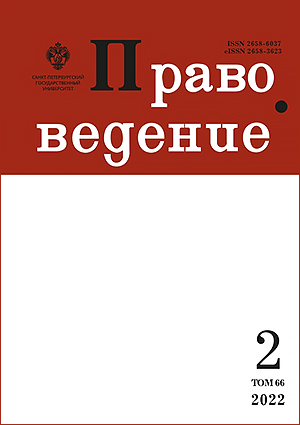Two cornerstones of registration system and their influence
DOI:
https://doi.org/10.21638/spbu25.2022.201Abstract
In the article, two primary functions of registration law are examined, namely securing information on legal relations regarding real property (“pure registration”) and attributing real property by the acts of public authorities (“public authorization”). These functions are considered as two basic principles of registration law that shape its norms, conflicting with each other, in terms of historical development, political and legal context. The historical analysis shows that the one or the other principle becomes decisive depending on the state policy and predominance of either centrifugal or centripetal tendencies with the state. “Public authorization” principle corresponds to centripetal tendencies and gets stronger as real estate becomes financial outlay of centrifugal forces. At that, centripetal tendencies may be confused with centrifugal tendencies when the registration system serves to redistribution of property and statuses in the state. Centrifugal tendency is coined by “public authorization” principle which ostensibly grows in strength when initially real estate constitutes the financial ground for centrifugal forces as the centripetal forces start dominating in the state. Centripetal tendency is characterized by closed number of titles in property, however, this number may be easily extended by amendments to the law, so that for those who can procure such amendments this list remains open. Centrifugal tendencies are welcomed by social strata that aim at fuller autonomy from the state on all social levels, remaining its subjects (“private property concept”). Political context suggests that not only registrar (functioning on the “pure registration” principle), but also public authority acting in substantive law dimension makes functional element of the registration system. In capitalist countries this authority would be the court with the powers to allow economic activity by means of awarding or rejecting claims for damages. In socialist countries this function is attributed to planning administrative authority, and real estate, along with property in general, is not among the factors that determine political and economical weight of the economic entity, and due to that, serves immediately the aim with which the real estate is granted, and the structure of the rights to it reflects it while serving strictly their purposes. By examination of legal context, the author considered the techniques (presumptions, fictions, burdens) which are applied to foster one of the principles, and the manifestations of their conflict. The author comes to conclusion that the tendency to promote “public authority” principle that intensifies these days in Russian registration system, stems from commercial courts’ interest in achieving a more active role in influencing Russian economy.
Keywords:
real estate registration, property, property law, mortgage
Downloads
References
Agarkov, Mikhail M. 2002. Selected works in private law. Vol. I. Moscow, JSC Center YurInfoR Publ. (In Russian)
Bazanov, Ivan A. 2010. Real Estate Regime in Russia: Its origins, state and proposed reform. Tomsk, Typo-Litograghy of Siberian Printing Partnership. (In Russian)
Bazanov, Ivan A. 2004. Origins of modern mortgage. Moscow, Statut Publ. (In Russian)
Gromov, Sergey A. 2011. Usufructus. Property rights: spotting and solving the problem. Ed. M. A. Rozhkova: 188–231. Moscow, Statut Publ. (In Russian)
Ivanov, V. V. (ed.). 1896. Customary law of Kharkov peasantry. Iss. 1, 2. Kharkiv, Typography of Region’s Government Publ. (In Russian)
Kramer, Ernst A. 2020. Das Prinzip der objektiven Zurechnung im Delikts- und Vertragsrecht. Vestnik grazhdanskogo prava 1: 241–262. (In Russian)
Nevolin, Konstantin A. 2006. The history of Russian civil laws. Part two: The book on property. Moscow, Statut Publ. (In Russian)
Pertaᶎicki, Leon. 2002. The rights of bona fide possessor to fruits in terms of dogma and policy of private law. Moscow, Statut Publ. (In Russian)
Priest, Claire. 2006. Creating an American Property Law: Alienability and Its Limits in American Legal History. Harvard Law Review 120: 385–458.
Reinhardt, Rudolf. 1957. Die Vereinigung subjektiver und objektiver Gestaltungskräfte im Vertrage. Festschrift zum 70. Geburtstag von Walter Schmidt-Rimpler: 115–138. Karlsruhe, Verlag C. F. Müller.
Rey, Hans. 2007. Die Grundlagen des Sachenrechts und das Eigentum. Bd. 1. 3. Aufl. Bern: Stämpfli.
Rudokvas, Anton D. 2011. Controversial questions of the doctrine of adverse possession. Moscow, Zakon Publ. (In Russian)
Rybalov, Andrey O. 2007. Economical assets and civil circulation. Objects of private law. Ed. M. A. Rozhkova: 78–94. Moscow, Statut Publ. (In Russian)
Yelyashevich, Vasiliy B. 2007. Selected works on legal entities, objects of private law and organization of their circulation. Vol. II. Moscow, Statut Publ. (In Russian)
Downloads
Published
How to Cite
Issue
Section
License
Articles of "Pravovedenie" are open access distributed under the terms of the License Agreement with Saint Petersburg State University, which permits to the authors unrestricted distribution and self-archiving free of charge.




